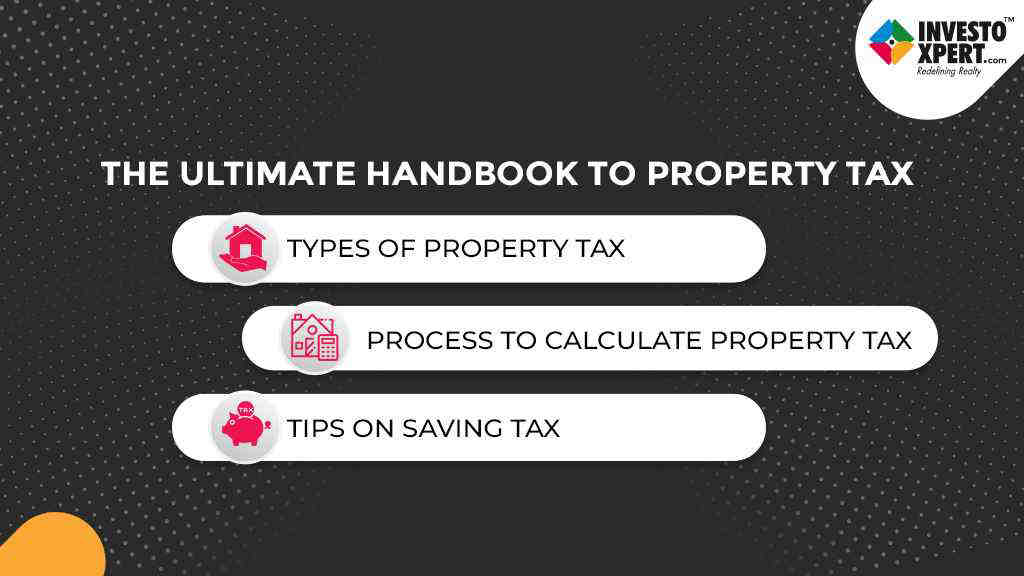Property Tax In India – Types, How To Calculate & Payment Option
By Investoxpert | 05 Oct 2023 | Real Estate

Property Tax In India, the term refers to the direct taxes levied by regional municipal governments or other government agencies on the owners of real estate situated within their purview.
The assessed valuation of the property, which is determined by the property's location, size, kind, and usage, is used to determine whether these taxes are imposed annually or semi-annually. Property taxes are an important source of money for local governments and are essential for providing a range of public services and facilities.
Property ownership is a great life achievement that entails a number of financial obligations, the most crucial of which is paying property taxes. Whether you are a seasoned homeowner or thinking about making your first real estate investment, it is essential to comprehend the complexities of property taxation.
In this article, we will clarify the what, why, and how of this statutory requirement by dissecting the complexity of property taxes in India.
Value of Property Tax Payment
Property tax payment is crucial since it promotes the operation and growth of your neighborhood. It provides funding for amenities, infrastructure, and public services that enhance inhabitants' quality of life. It also assures fair taxation and aids in maintaining correct property ownership records.
How Do Property Taxes Operate?
Property Tax In India, is a local tax known as "property tax" is imposed on people who own real estate, which includes both land and structures. It is determined using the assessed value of the property and the local municipal or government authority's established tax rate. The money from this tax, which supports neighborhood infrastructure and services, belongs to the property owners.
What Are The Various Types of Property Tax in India?

'
Property taxes in India come in a variety of forms, each of which has a distinct purpose and is regulated by a particular set of laws and authorities. The primary categories of property taxes and fees are as follows:
1.Municipal Property Tax:
This is the most prevalent Tax On Selling Property In India. It is assessed on residential and commercial premises that are under their purview by municipal corporations or regional urban entities. The assessed valuation of the property, which is based on its size, location, and use, determines the tax burden. This annual or semi-annual fee, which supports neighborhood infrastructure and services, is paid by property owners.
2.Capital Gains Tax on Property:
This applies to the revenue you generate from the sale of property. You can be eligible for long-term capital gains tax rates if you own the property for a specific amount of time. Property capital gains tax is governed by the Income Tax Act, and various restrictions may apply to exclusions or deductions.
3.Wealth Tax:
An individual's net wealth, which comprised the market value of their residential residences among other assets, was taxed in India until it was abolished in 2016. Since it was abolished, wealth tax is no longer applicable, but it is important to understand its historical context.
4.Stamp Duty and Registration Charges:
In India, stamp duty and registration fees must be paid to the state government when buying or selling a property. The amount of stamp duty varies from state to state and is based on the transaction value of the property. Registration costs are what you pay to have the local sub-registrar's office record the property transaction. Tax On Selling Property In India are one-time payments that are necessary to formally transfer ownership of the property.
How to Calculate Property Tax?
Property taxes and related costs can be complicated to calculate because they vary by area in India and depend on a number of different criteria.
A basic explanation of how each of these taxes and fees is normally calculated follows:
1. Municipal Property Tax
Property Tax = Assessed Value x Property Tax Rate is the formula for calculating property tax
2. Capital Gains Tax on Property
You would need to deduct the property's purchase price and any permitted deductions from the selling price in order to compute the tax.
3. Wealth Tax:
Individuals with annual incomes of more exceeding Rs 1 crore were subject to a 2% surcharge.
4. Stamp Duty and Registration Charges
Stamp Duty = Property Value * Stamp Duty Rate.
Registration fees, which are separate and are often a fixed sum, pay for the expense of registering the property in your name.
Please be aware that tax regulations and rates in India might change over time and differ from state to state. For the most recent and correct information applicable to your property and locality, speak with local authorities or a tax expert.
How To Save Tax On Selling Property In India?
Every time you sell a property, you must pay tax on the proceeds, a process known as capital gains. Any property sold after at least two years is considered to have long-term capital gains. A flat 20% tax is applied on long-term capital gains.
After accounting for inflation and the indexed cost of acquisition, the profit made must be taxed on capital gains.
Indexation is essentially a method of adjusting the asset's cost in accordance with the rate of inflation. It will raise your expenses while lowering your gains and, consequently, your tax obligation.
- Take Advantage of the Indexation Benefit
- Joint Ownership
- Reduce Selling Expenses:
- Buy New Property (Exemption under Sec 54)
- Buy New Residential Property (Exemption under Sec 54F
- Investment in Bonds (Exemption under 54EC):
- Tax Loss Harvesting :
- Invest the capital gain in Capital Gain Account Scheme (CGAS
- Reinvest gains into shares of company engaged in manufacturing
Conclusion
To sum up, property tax in India exemptions and refunds are useful instruments for raising money, advancing social welfare, and encouraging sustainable activities. Certain population groups are supported by the government, demonstrating its commitment to promoting a varied and egalitarian society. These groups range from senior residents and people with impairments to owners of historic properties and eco-conscious citizens.
Thus, now you know How To Save Tax On Selling Property In India. Hope reading this blog was helpful.
Read also:- The Rise of Sustainable Living: Eco-Friendly Homes in India
Read also:- Interior Design Trends Transforming Indian Homes: Expert Insights
Read also:- ROI In Real Estate: Analysing Returns And Profits For Indian Investors
Read also:- Navigating Legalities: Essential Guidelines For Property Buyers In India
Read also:- Rental Market Trends in India: How to Make the Most of Your Investment?
Read also:- The Power of Virtual Reality in The Real Estate Business
Read also:- Mistakes to Avoid While Dealing in a Property
Read also:- Real Estate Trends That Will Rule in 2022
Read also:- High-Rise Building: Everything You Need To Know
Read also:- RERA - All You Need To Know About Rera Gujarat Before Buying A House In 2023!
Read also:- How Much Are Closing Costs For Home Sellers?
Lets Get Your Dream Home
I authorize InvestoXpert and its representatives to Call, SMS, Email or WhatsApp me about its products and offers. This consent overrides any registration for DNC / NDNC.